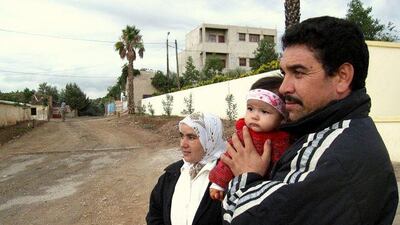Zerarda // Morocco Tiziri el Bechnaoui is a six-month-old girl in the Middle Atlas mountains with black eyes and a pixie nose who, for administrative purposes, does not exist. Since her birth last March, officials have refused to register her because "Tiziri" is not a state-approved Arabic name, said her father, Abdalla el Bechnaoui. "But then, we're not Arabs."
Mr el Bechnaoui and his wife, Jamila Aarrach, are Imazighen, also known as Berbers, descendants of herders and farmers who have inhabited North Africa for thousands of years. Now they are among a handful of Amazigh couples who are challenging Moroccan convention and bureaucracy to give their children traditional names. Officially, the government has scrapped restrictions on names as Morocco has gingerly warmed to its Amazigh side. But Amazigh rights activists say that in some rural areas, parents still face resistance from officials clinging to outdated policies.
"The government does not have a clear strategy on sociocultural issues," said Brahim Akhiate, the secretary general of the Moroccan Association for Cultural Research and Exchange, a leading Amazigh rights group. "Local authorities aren't sure what to do." The road to Zerarda narrows as it climbs into the Amazigh heartland of the Middle Atlas. The town huddles against a mountainside: yellow concrete houses, sycamore trees and a few cafes.
Tiziri and her parents live in an apartment up a dark staircase near Mr el Bechnaoui's clothing shop. The window looks out on swooping hillsides planted with olive trees and vegetables by Zerarda's farmers, most of them Imazighen. They are a copper-hued people believed to have reached North Africa around 2000BC. The only record of their arrival may be prehistoric rock carvings of war chariots in the Sahara.
When Arab invaders arrived in the seventh century, the Imazighen swiftly adopted Islam. Today the majority of North Africans are of mixed Amazigh and Arab ancestry, with most considering themselves Arabs. But some of them have preserved the old customs and language, identifying themselves as Imazighen. The largest group lives in Morocco, where they make up about one-third of the country's 30 million people.
After Morocco gained independence from its coloniser, France, in 1956, the government embarked on a vigorous campaign to Arabise the country, prompting activists such as Mr Akhiate to organise in defence of their culture against a solidly pro-Arab political establishment. King Mohamed VI responded in 2001 with a change in direction, pronouncing the Imazighen integral to Morocco and establishing the Royal Institute for Amazigh Culture to promote their language and traditions.
"Obviously, Amazigh names are part of our heritage," said Ahmed Boukous, the director of the institute. "Why Tiziri? We just liked the name," said Mr el Bechnaoui, cradling his daughter in the family's sitting room beside a table laid with green tea and sugary biscuits. "It can mean both 'moon' and 'star that appears at dawn'." "I want her to know her roots," Mrs Aarrach said, pouring more tea into the glasses. "I want her to be proud of her name."
About 200 to 300 Amazigh families share that wish, although only a few act on it, said Ahmed Arehmouch, the family's lawyer. "Most end up deciding they don't have time to wrangle with authorities." Few Moroccans today bear Amazigh names. One who does is Mr Akhiate's daughter, Toufitri, 32, a dermatologist in the capital, Rabat. Her name means "more beautiful than a star" in the Amazigh language, Tamazight, a distant cousin of Arabic.
"When I was at school, it was difficult sometimes to make people understand that my name is Moroccan," said Mrs Akhiate, who has nevertheless named her daughters Simane and Illi, which are traditional names meaning "union of two souls" and "my daughter", respectively. A list of approved Arab names was compiled under King Hassan II, Mr Boukous said. Last year Chakib Benmoussa, the interior minister, said that no such list was in force, citing instead a law stipulating that first names must be Moroccan in character.
However, that message has not reached Zerarda, Mr el Bechnaoui said. "When I went to register Tiziri, I was shown a list of names, and hers wasn't on it," he said. Officials at the provincial level "told me the same thing". A Zerarda official said the town hall routinely referred to a list of names dating to 2003. Ahmed Hajoubi, a civil registry official for Mr el Bechnaoui's province of Taza, declined to comment on the reported use of such a list.
In August a court ruled in favour of Mr el Bechnaoui and Mrs Aarrach's request to register their daughter as Tiziri, but the couple are still awaiting a final go-ahead from provincial officials. Such delays "are due to a slow administration", Mr Boukous said. "At the same time, there remain elements within the government that consider the Amazigh identity to be divisive." In Zerarda, Mr el Bechnaoui and Ms Aarrach are hunkering down for a long wait.
"I'm upset, but not exhausted," Mr el Bechnaoui said as cold autumn wind blew through the broken window into the sitting room. In his lap, Tiziri squeaked happily and reached up to play with his moustache. "I'll pursue this as long as it takes," he said. "It's the identity of my daughter. And mine, too." @Email:jthorne@thenational.ae

